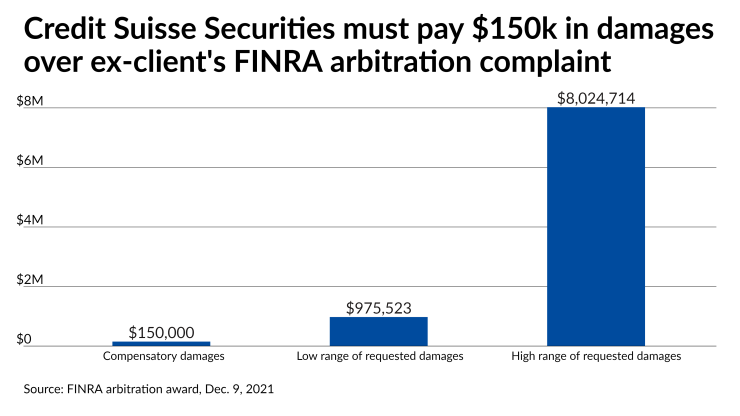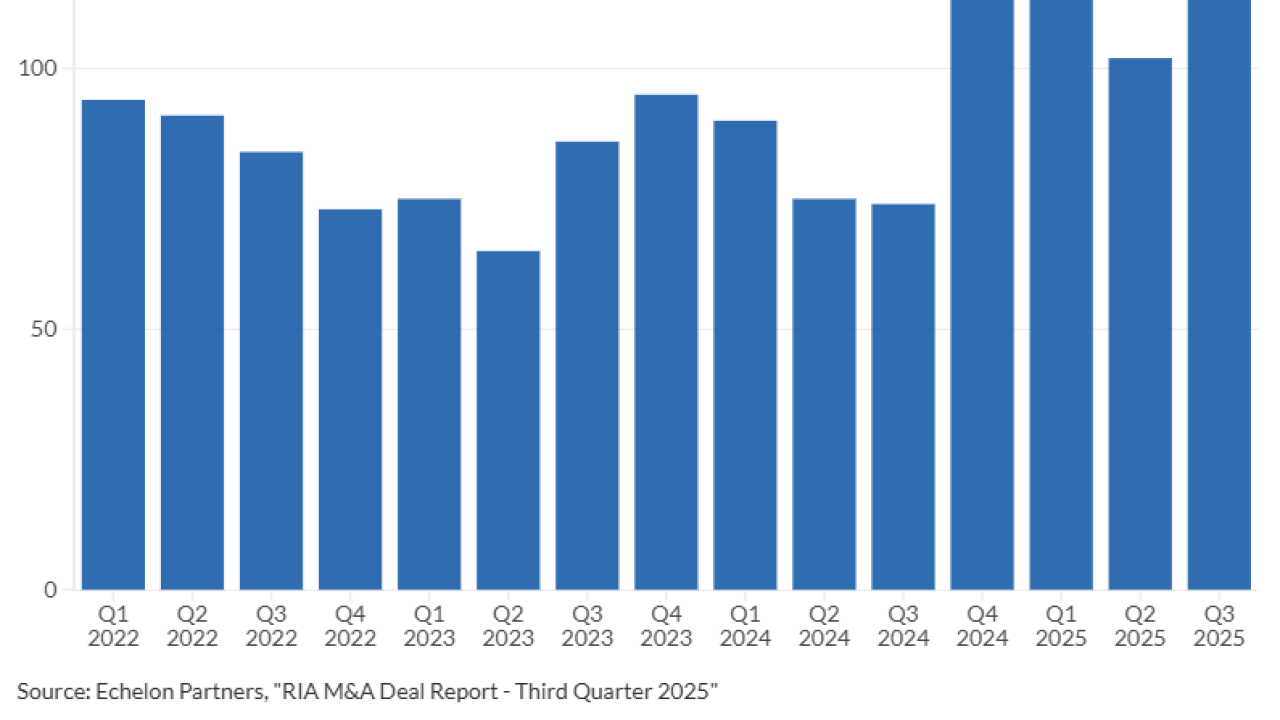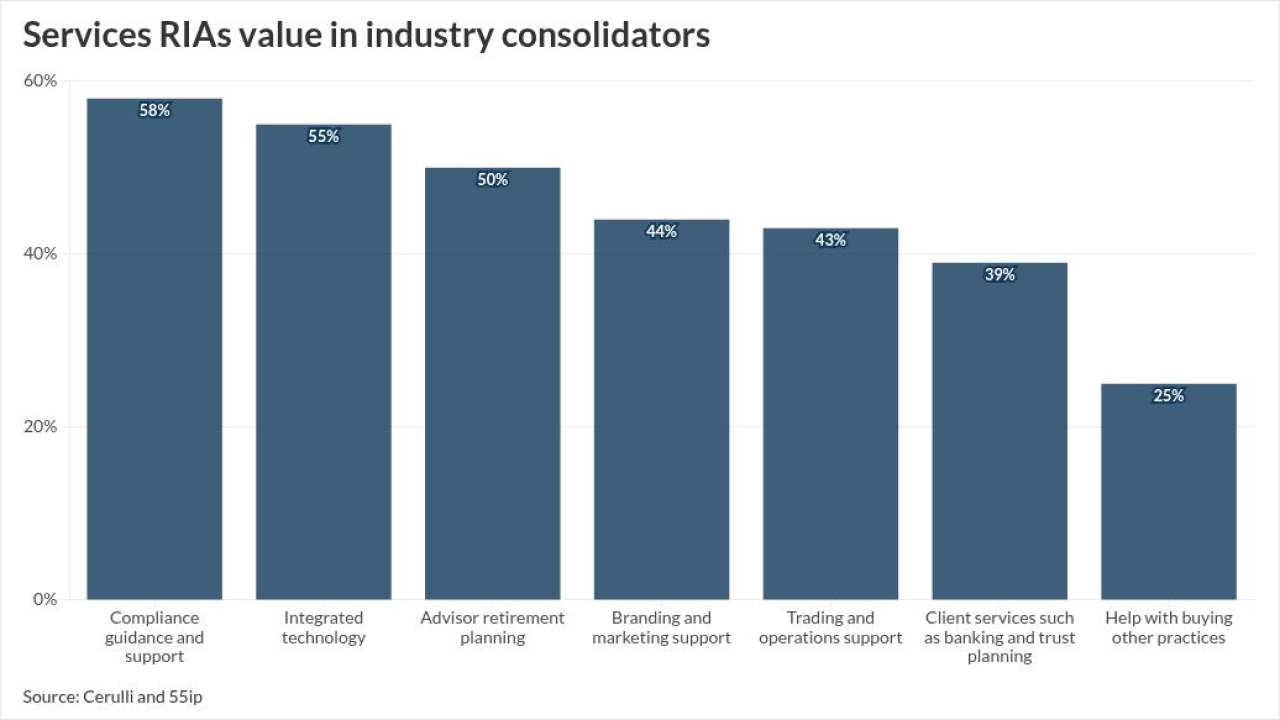A wealth manager whose parent firm is reorganizing amid major compliance woes must pay a client $150,000 in damages, even though FINRA arbitrators found the complaint to be false.
Credit Suisse Securities will pay the award for negligent supervision as compensatory damages to John M. Marmaduke, the trustee of The John Mitchell Marmaduke Revocable Living Trust B,
“It is difficult to make sense of the award,” securities attorney Robert Herskovits, a veteran who has represented wealth managers and financial advisors in hundreds of arbitration cases with Herskovits PLLC, said in an email. “Credit Suisse is hit for supervisory deficiencies but the panel denied all underlying claims of wrongdoing. Without underlying wrongdoing, it is difficult to understand how the arbitrators felt the customer was harmed by supervisory lapses.”
Representatives for Credit Suisse declined to comment. An attorney for Marmaduke, who sought between $976,000 and $8 million in damages at the hearings last month, didn’t respond to inquiries. Van Hoek didn’t respond to requests at the UBS branch where he’s now employed.
On Dec. 13, Credit Suisse Group appointed new heads of its global wealth units and its division in the Americas and Switzerland
“Risk management will be at the core of our actions, helping to foster a culture that reinforces the importance of accountability and responsibility,” Chairman Antonio Horta-Osorio said in a statement to Bloomberg News. The approach “should enable us to achieve sustainable growth together with substantially lower risk and to deliver lasting value for all our key stakeholders.”
While the arbitration case involves hedge funds and international investments, it’s not clear whether it relates to the other scandals. As is common in FINRA awards, the arbitrators left out the reasons for their unanimous decision to order the award while approving the expungement and rejecting Marmaduke’s claims of breach of fiduciary duty, negligence, fraud, breach of contract and violations of the SEC’s antifraud rules. Van Hoek, a 35-year industry veteran with an otherwise clean record on BrokerCheck, and his former branch manager testified in the case.
In considering the expungement, the arbitrators reviewed the Credit Suisse “operations manual that details the firm’s duty to provide account supervision,” along with “various exhibits introduced into evidence” such as emails and notes among the parties and between Marmaduke and Van Hoek, according to the ruling.
Marmaduke didn’t name Van Hoek, who currently operates his practice from a West Palm Beach, Florida-based UBS Private Wealth Management office, as a respondent in the case. He filed the case in July 2018 over investments that included the Credit Value Fund III, the Credit Suisse China Harvest III Feeder Fund and the BlackGold Opportunity HedgeFocus Fund.
“I believe these allegations have no merit and I have requested as well as Credit Suisse that all references to this disclosure be expunged from my CRD,” Van Hoek said in a statement on BrokerCheck.
The ruling authorizes the expungement after Van Hoek receives a confirmation of the decision in court. Credit Suisse had denied Marmaduke’s allegations in 2018, and, in the hearings, the brokerage requested the record of the complaint be removed from Van Hoek’s record.
By his own account, Marmaduke had expressed aversion to the risks of equities and bonds but “was adamant in his demand for returns that were higher than the low-risk securities,” according to the award. Balking at Van Hoek’s repeated warnings to stick to lower-risk products, Marmaduke sought out alternative investments that fit into “his strong opinions regarding the alleged weakness of the American economy and the dollar in particular,” the award states.
Marmaduke made “a South American investment” after trips to Panama and elsewhere in the region, and he had expressed interest in investing in China as a hedge against the American economy before Van Hoek proposed the idea, according to the document. Interestingly, Marmaduke invested in a “short-term” product tied to gold but demurred from placing any other assets in precious metals as an alternative investment, the document states.
Van Hoek provided Marmaduke “with extensive information regarding the alternative investments at issue,” according to the award. “His only complaint against unnamed party Van Hoek was that he did not break it down and make it clear enough to prevent him from making the alternative investments, which appears to be a classic case of buyer’s regret. Based upon the evidence before the panel and the testimony regarding unnamed party Van Hoek’s clean record over an extended career, the panel has granted the request for expungement.”








